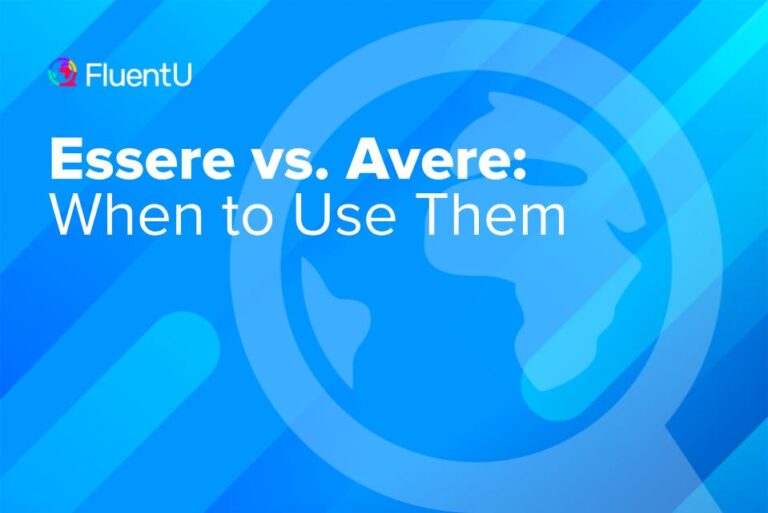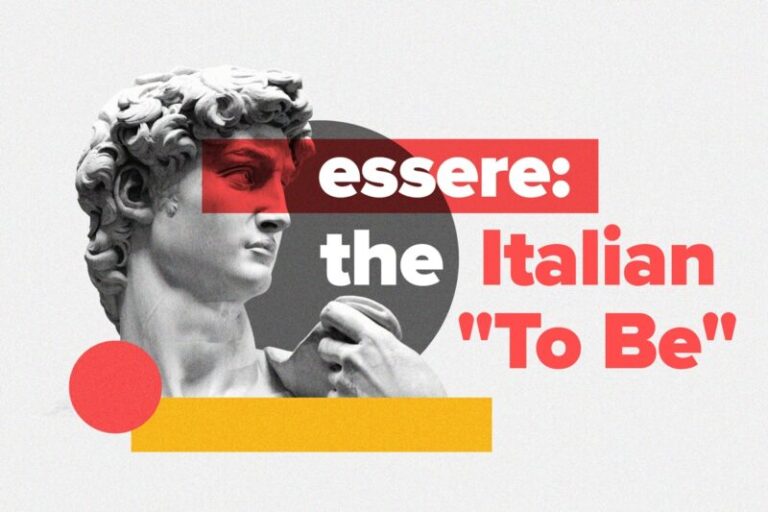Italian Nicknames: 118 Terms of Endearment
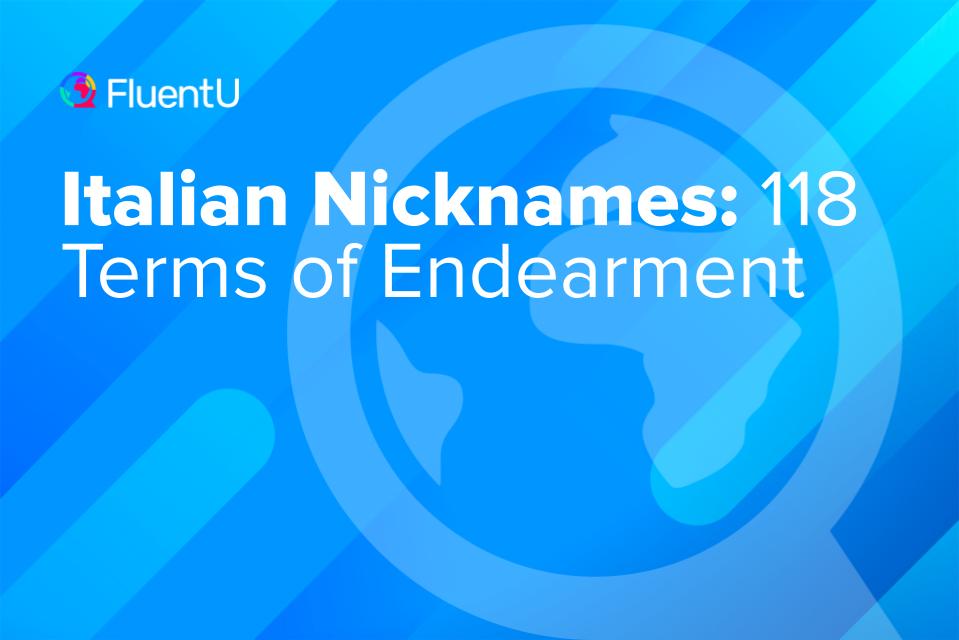
Italians have some sweet terms of endearment to go along with all that romance. And it’s not just for lovers—there are Italian nicknames for everyone.
I polled my Italian in-laws for advice on some of the best and most common Italian terms of endearment, and have come up with a list of 118 terms that they assure me will have anyone sounding as though they were born in Sicily!\.
Download: This blog post is available as a convenient and portable PDF that you can take anywhere. Click here to get a copy. (Download)
Cute Pet Names for Kids
Italian family bonds are generally very close. As a result, children benefit from lots of love and terms of endearment are lavished onto them, too. A few can even be used by people outside the family if they don’t know the child’s actual name.
Examples:
- Amoruccio – Little Darling
- Angioletto / Angioletta – Little Angel
- Bimbo / Bimba – Baby, Kiddo (Can be used by anyone.)
- Cocca di mamma / Cocca di papà – Apple of Mother’s/Father’s eye (Literally: “Mother’s/Father’s pet,” but without the negative connotation of “teacher’s pet.”)
- Cucciolo / Cucciola – Puppy, Baby
- Cuoricino / Cuoricina – Little Heart
- Fatina – Little Fairy
- Fiorellino / Fiorellina – Little Flower
- Gioia – Joy (Can be used by anyone.)
- Micio / Micia – Kitten, Kitty
- Nuvolina – Little Cloud
- Peluche – Teddy-bear (Literally: Plush, Soft Toy.)
- Piccino / Piccina – Little One
- Pippi – A “Pippi Longstocking” (Used for children who resemble the fictional character created by Astrid Lindgren.)
- Principe / Principessa – Prince/Princess
- Pupo
/ Pupa
– Baby, Kiddo, Doll (Different regions use this one differently.)
- Stella
– Star (Can be used by anyone.)
- Stellina – Little Star (Can be used by anyone.)
- Topolino / Topolina – Little Mouse
Of course, sometimes your child (or sibling) won’t be a perfect angioletto/a. You might sigh and shake your head, but let them know you still love them with a teasing endearment.
Examples:
- Bestiolino / Bestiolina – Little Beast
- Birichino / Birichina – Little Rascal
- Brontolone / Brontolona – Grumpy (Most often used when referring to adults or elderly people.)
- Cattivello / Cattivella – Trouble-maker
- Diavolino / Diavolina – Little Devil
- Furbetto / Furbetta – Naughty
- Furfante – Scoundrel
- Monello / Monella – Urchin, Street Rat
- Mostro – Monster (Can be used for any gender.)
- Pazzo / Pazza – Crazy
- Pestifero / Pestifera – Troublemaker
- Puffo / Puffetta – Smurf/Smurfette
- Pulciosetto / Pulciosetta – Mangy (Literally: Little Flea-ridden One.)
- Puzzone / Puzzona – Stinker
- Rompiscatole – Pain in the neck (Most often used when someone is truly annoying you.)
Terms of Endearment for Friends
In addition to giving each other nicknames, friends often address each other informally in other ways. While Italian doesn’t have exact equivalents to English “Bro,” “My Dude” or “Mate,” there are some terms that come close.
Examples:
- Amico
/ Amica
– Friend
- Migliore amico – Best friend (Use when speaking about someone rather than to them.)
- Capo – Boss, Chief (Slang. If you like mafia movies, you know this one already!)
- Compagno di avventure – Adventure companion (Someone who’s been with you through thick and thin; a bit like “partner in crime.”)
- Compare / Comare – Old Friend (This one’s a bit old-fashioned. It may also mean “godfather/mother” or “best man/bridesmaid.”)
- Fratello
/ Sorella
– Brother/Sister
- Fratellino / Sorellina – Little Brother/Sister
- Fratello d’anima / Sorella d’anima – Brother from another mother/Sister from another mister (Literally: “Brother/sister in spirit.”)
- Gnocco / Gnocca – Handsome, Good-looking (A slang term you can use to compliment your close friends. If it reminds you of gnocchi [dumplings], you’re not wrong! It’s not uncommon for food words to be used as endearments.)
- Socio / Socia – Partner, Fellow
- Vecchio / Vecchia – Old Friend (Slang. Literally: Old Man/Woman.)
- Zio / Zia – Dude/Dudette (Slang. Literally: Uncle/Aunt.)
Terms of Endearment for Partners
English speakers often say “Honey,” “Babe” or “Dear” (to name just a few!) instead of calling their significant other by name, right?
Well, Italians do that, too!
Examples:
- Amore mio
– My love (The most classic Italian term of endearment. Used between couples, it’s a sign that they’ve made a love match that they intend to keep.)
- Anima gemella – Soulmate (Literally: Twin soul. As a point of interest, there’s no male form of the noun anima [soul], so use Anima gemella to refer to either a male or a female.)
- Anima mia – My soul (A serious, from-the-heart, love-you-forever endearment.)
- Bellezza – Beauty (Your girlfriend or wife will appreciate this one.)
- Bello
/ Bella
– Handsome/Beautiful (Can actually be used casually by anyone, but casual can become intimate depending on the players and setting.)
- Bellissimo / Bellissima – Most handsome/Most beautiful (Use superlatives to make your special someone feel special!)
- Caro / Cara – Dear (Another one that can be used with friends or lovers.)
- Cuore mio – My heart (Wildly romantic. If il tuo ragazzo [your boyfriend] has just become il tuo fidanzato [your fiancé], this might be a good choice for you to pull into the day-to-day!)
- Dolce metà – Better half (Literally: Sweet half. You can say la mia dolce metà [my better half] when you speak about your wife, husband, partner, etc.)
- Dolcezza – Sweetheart, Honey (Literally: Sweetness. This one is a little old-fashioned, but still cute.)
- Fiore mio – My flower (Note: Although fiore is always masculine, a female partner will likely appreciate this endearment most.)
- La mia perla – My pearl
- Luce dei miei occhi – Light of my life
- Mio amato / Mia amata – My beloved
- Mio re / Mia regina – My king/My queen (If your children are princes or princesses, naturally your partner is a king or queen!)
- Polpetta – Meatball (An especially fun one that can be used for any gender—yes, really! Polpetto can also be used, but it’s uncommon.)
- Raggio di sole – Ray of sunshine
- Splendore mio – My splendor
- Tesoro – Darling (Literally: Treasure. A classic that can be used for any family member.)
- Vita mia – My life (Your significant other may melt if you lean in close and say, “Sei la vita mia.” It’s best saved for those important moments!)
Creative Nicknames for All
Many of the Italian endearments listed above can be used for anyone you know well, including friends, family members and partners. If none of them are perfect for your loved one, don’t worry: there are lots more where those came from!
It’s quite common for Italians to nickname someone after an animal or a food, even ones that might be rude in the wrong context, like pulce (flea) or patata (potato). You can also call someone after a trait of theirs that particularly stands out, for better or worse. What is a friend if not someone you can tease with no hard feelings, right?
Here are some example Italian nicknames based on animals, foods and personal attributes.
Animal-based nicknames
- Anatroccolo / Anatroccola – Duckling
- Cerbiatto / Cerbiatta – Fawn
- Coccinella – Ladybug
- Coniglietto / Coniglietta – Bunny
- Farfallina – Little Butterfly
- Gattino / Gattina – Kitten, Kitty
- Leoncino / Leoncina – Little Lion
- Leprotto / Leprotta – Young Buck, Young Hare (Note: Male hares and rabbits are called bucks. The more you know!)
- Lumacone – Slowpoke (Literally: Big Slug.)
- Lupacchiotto / Lupacchiotta – Little Wolf
- Maialino / Maialina – Little Pig, Piglet
- Orsacchiotto / Orsacchiotta – Big Bear
- Papera – Duck (Only used for girls.)
- Passerotto / Passerotta – Little Sparrow
- Pesciolino / Pesciolina – Little Fish
- Pulcetta – Little Flea
- Pulcino / Pulcina – Chick
- Scimmietto / Scimmietta – Little Monkey
- Scricciolino / Scricciolina – Little Wren
- Tartaruga – Turtle (To refer to someone who’s slow in doing something.)
- Tigre – Tiger
Food-based nicknames
- Biscottino / Biscottina – Little Cookie
- Caramellina – Butterscotch
- Ciliegina – Little Cherry
- Cioccolatino / Cioccolatina – Little Chocolate
- Cipollino / Cipollina – Little Onion
- Fagiolino / Fagiolina – Little Bean
- Formaggino / Formaggina – Little Cheese
- Fragolino / Fragolina – Little Strawberry
- Gnocchetto / Gnocchetta – Little Dumpling
- Pasticcino / Pasticcina – Little Pastry
- Patatino – Little Potato
- Salsicciotto / Salsicciotta – Little Sausage
- Zucchetto / Zucchetta – Little Pumpkin
- Zucchina – Little Zucchini
Attribute-based nicknames
- Chiacchierone / Chiacchierona – Chatterbox
- Coccolone / Coccolona – Cuddlebug
- Dormiglione / Dormigliona – Sleepyhead
- Fortunello / Fortunella – Lucky
- Furbacchione / Furbacchiona – Sly person, Smart-aleck
- Giramondo – Globetrotter
- Golosone / Golosona – Glutton (To refer to someone who loves eating sweets.)
- Mammone – Mamma’s Boy (Unlike in English, this is not an insult in Italian. Remember, family relationships are very important.)
- Mangione / Mangiona – Big Eater (To refer to someone who simply loves eating.)
- Mattacchione / Mattacchiona – Joker
- Mitraglietta – Machine-gun (To refer to someone who speaks very fast.)
- Sciocco / Sciocca – Fool, Silly (For example, you can say “non fare lo sciocco” and it means “don’t be silly.”)
- Tenerone / Tenerona – Big Softie (You can say to someone, “sei un tenerone” when you want to tease them in a friendly way.)
- Tontolino / Tontolina – Dummy (As sciocco above.)
How to make an Italian nickname
There’s really no limit to the words you can use to make a nickname in Italian. It just takes a bit of creativity and the right tools!
Diminutives
A diminutive is a base word made “little.” Does smaller equal cuter or more precious? Yes, sometimes it does!
Adding a diminutive suffix such as -ina/o or -etto/a is like waving a magic wand over whatever word it’s attached to. Poof! An ordinary word becomes an endearment!
Augmentatives
An augmentative is the opposite of a diminutive: a base word made “big” with a suffix such as -one/a or -acchione/a.
Be careful, though: bigger in this case is not always better. Sometimes an augmentative word can become “fat” or change in meaning entirely.
Use your imagination, follow your heart and add a suffix to common nouns to turn them into your own words of love! If you want to find more examples of the ways Italians add suffixes to words, you can look for Italian content to watch, like TV shows or movies. You can also find Italian videos on the FluentU program and hear these terms of endearment used in context.
FluentU takes authentic videos—like music videos, movie trailers, news and inspiring talks—and turns them into personalized language learning lessons.
You can try FluentU for free for 2 weeks. Check out the website or download the iOS app or Android app.
P.S. Click here to take advantage of our current sale! (Expires at the end of this month.)
Remember to stay true to the word’s gender when adding a suffix.
Attributes
Sometimes you don’t need a suffix to make a word into a nickname. You can just call someone after a stand-out trait or favorite hobby!
Is your brother always breaking lucky? Has your friend been around the world twice? Is your aunt a fast talker? Go ahead and give them a nickname based on that attribute.
Just make sure you say it with love.
Because, really, love does make the world go around, doesn’t it?
Especially in the lover’s paradise, Italy, where it’s super easy to make friends and find lovers.
Take your new, loving vocabulary and explore The Boot.
Go for the pizza and the cannoli. Enjoy the history, art and music. Then, stay for the love!
Download: This blog post is available as a convenient and portable PDF that you can take anywhere. Click here to get a copy. (Download)
And One More Thing...
If you're as busy as most of us, you don't always have time for lengthy language lessons. The solution? FluentU!
Learn Italian with funny commericals, documentary excerpts and web series, as you can see here:
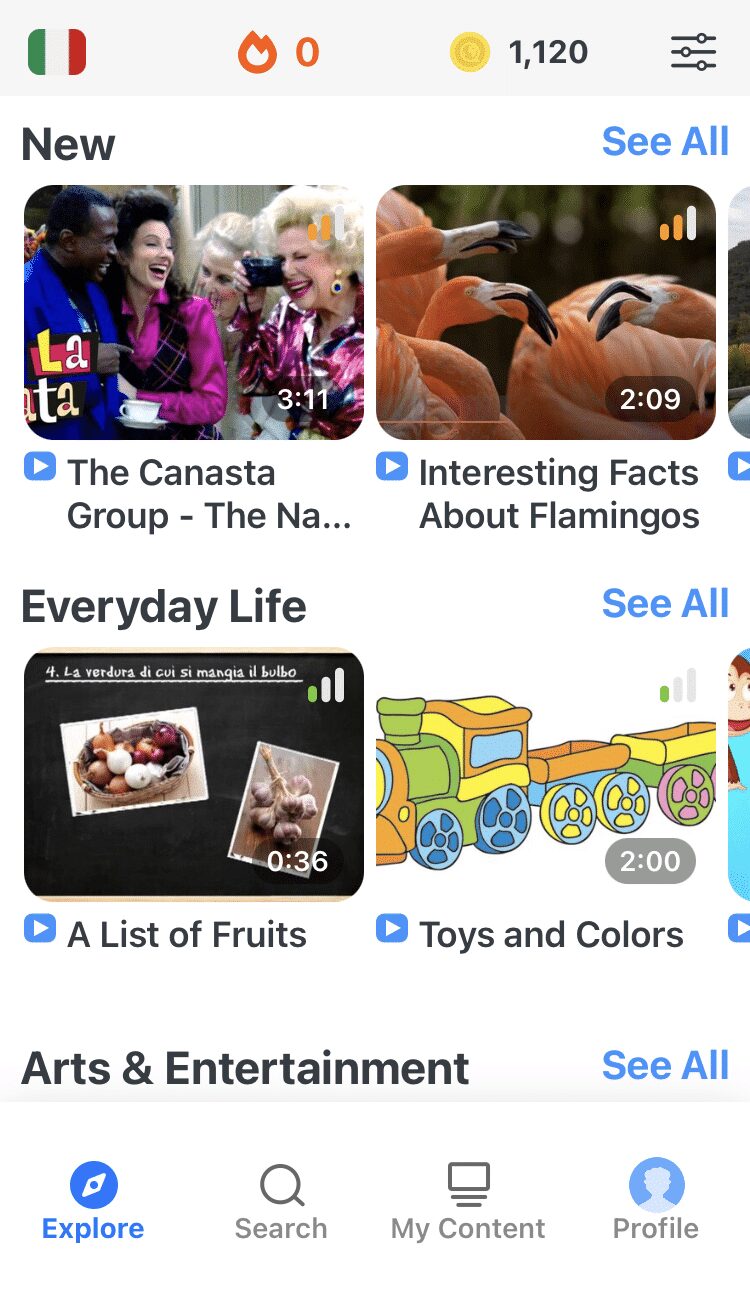
FluentU helps you get comfortable with everyday Italian by combining all the benefits of complete immersion and native-level conversations with interactive subtitles. Tap on any word to instantly see an image, in-context definition, example sentences and other videos in which the word is used.
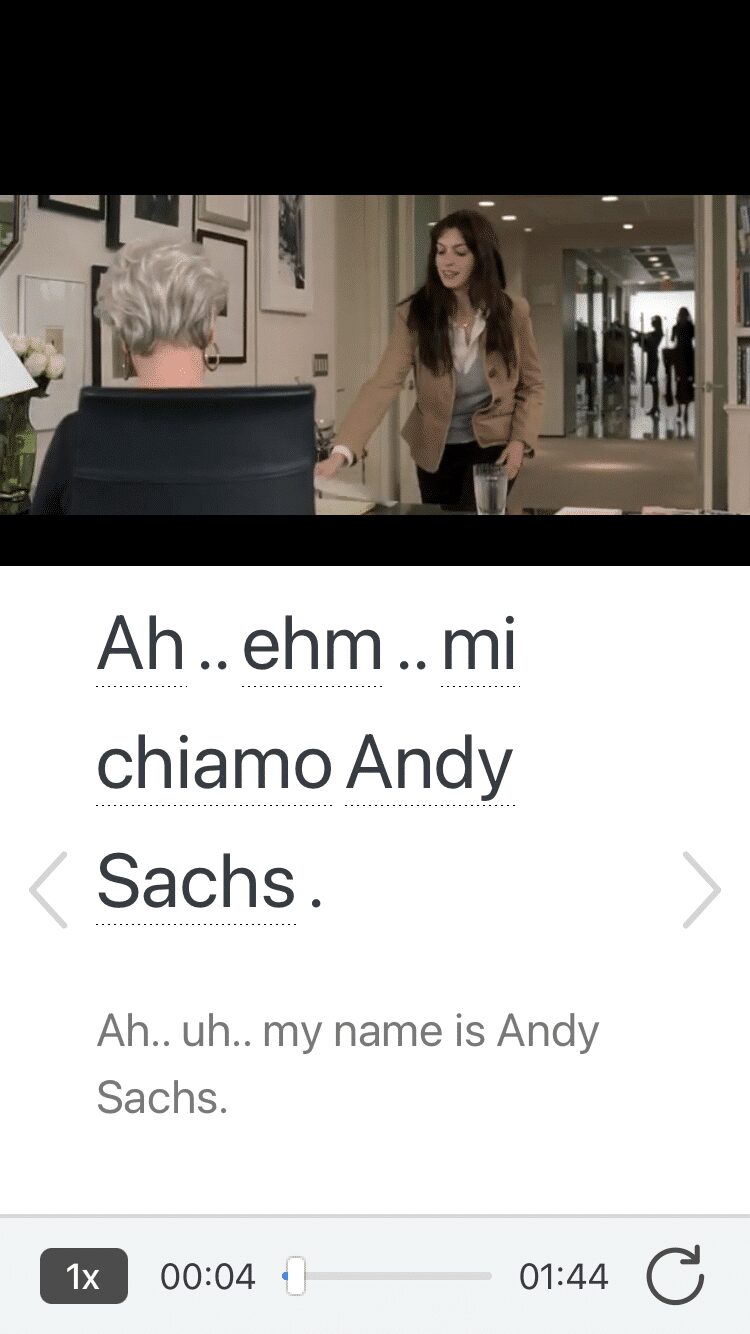
Access a complete interactive transcript of every video under the Dialogue tab, and review words and phrases with convenient audio clips under Vocab.
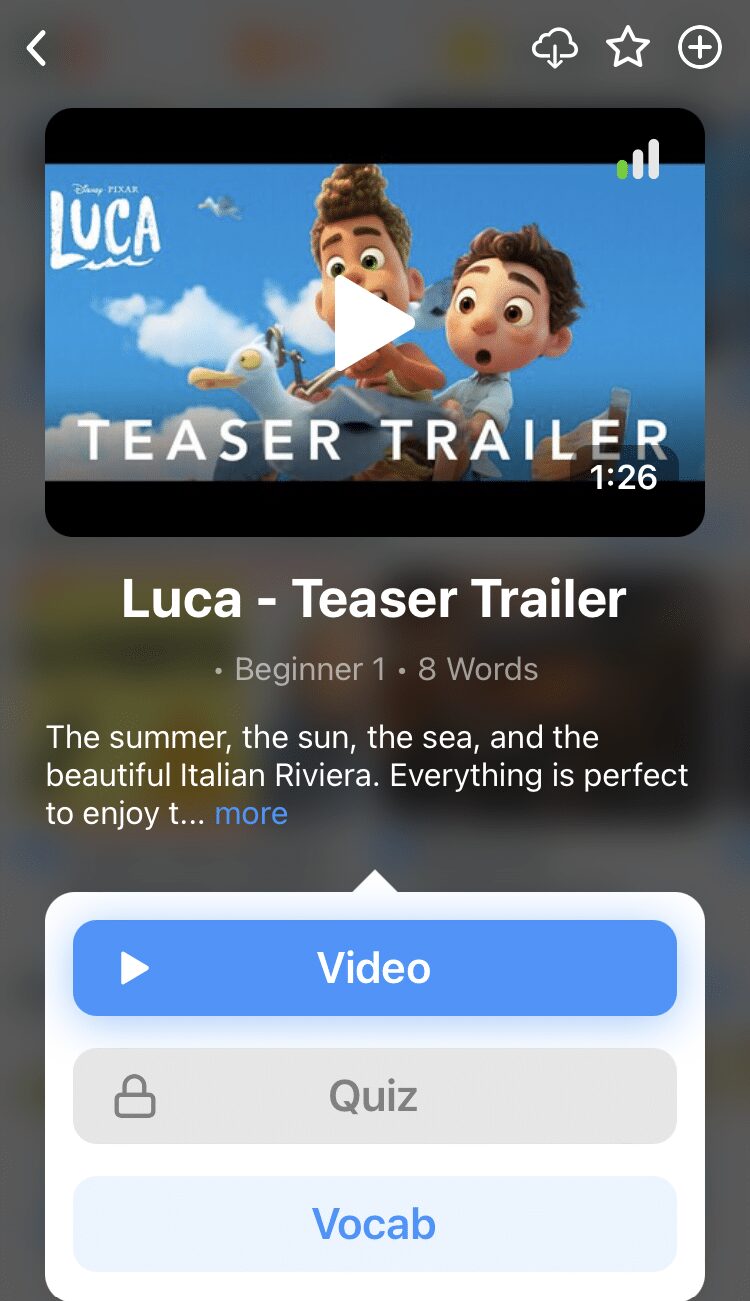
Once you've watched a video, you can use FluentU's quizzes to actively practice all the vocabulary in that video. Swipe left or right to see more examples of the word you’re on.

FluentU will even keep track of all the Italian words you’re learning, and give you extra practice with difficult words. Plus, it'll tell you exactly when it's time for review. Now that's a 100% personalized experience!
The best part? You can try FluentU for free with a trial.
Start using the FluentU website on your computer or tablet or, better yet, download the FluentU app from the iTunes or Google Play store. Click here to take advantage of our current sale! (Expires at the end of this month.)

